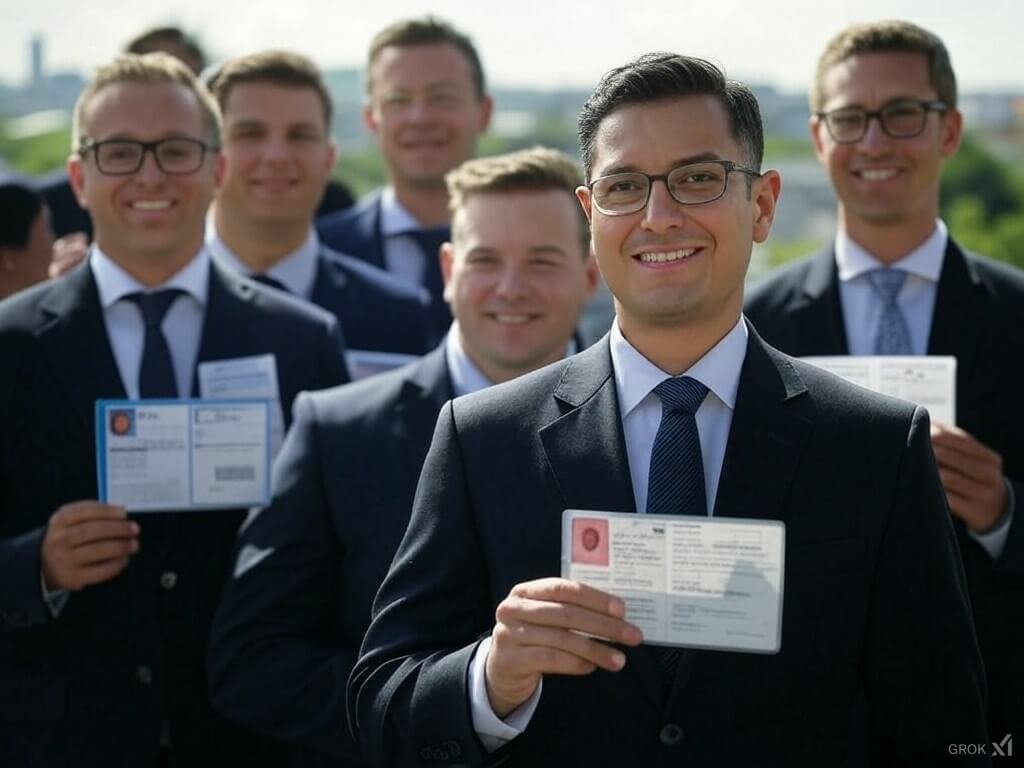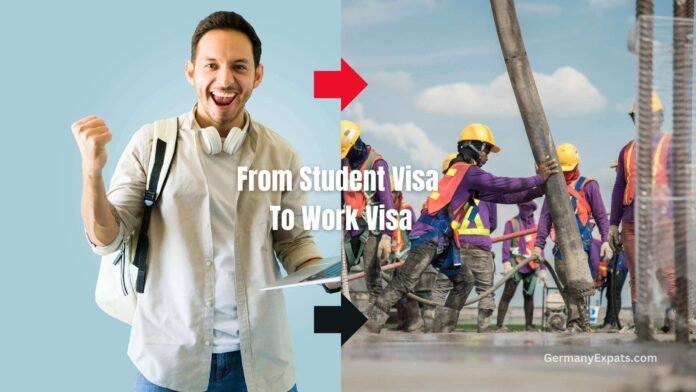Navigating the journey from a student visa to work visa in Germany can be a daunting yet rewarding experience. With Germany’s thriving economy and vast opportunities, this transition is a significant step toward building a career in one of Europe’s most dynamic countries. This guide provides a comprehensive roadmap to ensure a seamless and successful transition.
Understanding the Basics
Transitioning from a student visa to work visa in Germany is a natural step for many international students. Germany encourages university graduates to stay and contribute to its workforce. However, this process involves understanding specific requirements and timelines.
Eligibility Criteria for Switching to a Work Visa
- Completion of Studies: To apply for a work visa, you must have completed a recognized degree program in Germany. Ensure your university is accredited, as this is a critical requirement.
- Valid Residence Permit: While on a student visa, ensure your residence permit remains valid during your job search and transition process. If your current visa is nearing expiry, you can apply for an 18-month job-seeking visa.
- Job in Your Field of Study: You must secure relevant employment for your degree program. The position must align with your qualifications and meet Germany’s labour standards.
Post-Graduation Options in Germany
After finishing your studies in Germany, you have several options to help you start working or continue your education.
One main option for job seekers is to get a temporary residence permit. This permit lets international graduates stay in Germany for up to 18 months while they look for a job in their field of study. During this time, graduates can find job opportunities, attend interviews, and connect with potential employers.
Candidates must meet specific eligibility criteria to qualify for this job seeker visa. Typically, this includes having a valid German degree or an equivalent foreign degree recognized in Germany, proving financial stability to support oneself during the job search, and having health insurance coverage.
Once graduates secure a job offer, they can switch from a job seeker permit to a standard work visa or an EU Blue Card. These options provide better rights and benefits for skilled workers in the European Union. This process allows graduates to gain valuable work experience in Germany and build a strong foundation for a long-term career there.
These options after graduation give international students a great chance to use their education effectively and join the German labor market.
Steps to Transition from Student Visa to Work Visa
Step 1: Apply for an 18-month Job-Seeking Visa
After graduation, you can extend your residence permit for up to 18 months to look for a job. Go to your local Ausländerbehörde (Foreigners’ Office) to start this process. Bring important documents with you, such as proof of graduation, valid health insurance, and proof that you have enough money to support yourself while you search for a job. This extension can help you move from student life to working life.
Step 2: Secure a Job Offer
Leverage platforms like StepStone and LinkedIn to find job opportunities. Ensure your employment contract complies with Germany’s minimum salary laws for work visa eligibility.
Step 3: Apply for a Work Visa or EU Blue Card
Once you have a job offer, you can transition to a work visa or apply for the prestigious EU Blue Card. The latter offers additional benefits, such as simplified residency processes and the ability to work in other EU countries.
Step 4: Gather Necessary Documents
To smoothly transition from a Student Visa to a Work Visa, you must visit the official website or refer to this general checklist of documents.
Step 5: Attend Your Appointment at the Foreigners’ Office
Schedule an appointment with the Ausländerbehörde to submit your application. Bring all necessary documents, and be prepared to answer questions about your employment and career plans.
Job-Seeking Tips for Graduates

Polish Your Resume
Adhering to German hiring standards is essential when preparing your resume for the German job market. Highlight the skills and experience related to your field of study to make a strong impression. We have a nice guide about the German resume that you must read; it provides valuable insights and tips to help you stand out.
Network Actively
Attend career fairs and alums events. Platforms like XING and professional organizations can help you connect with potential employers.
Learn the German Language
While many jobs are available in English, proficiency in German significantly increases your employment prospects. Consider taking language courses through Goethe-Institut.
Key Benefits of Transitioning to a Work Visa
1. Long-Term Residency Opportunities
Switching from a student visa to work visa in Germany is the first step toward permanent residency. You may qualify for a settlement permit after 33 months on an EU Blue Card.
2. Access to Social Benefits
Work visa holders contribute to Germany’s social security system, granting them access to health insurance, pensions, and unemployment support.
3. Career Growth
Germany’s robust economy and diverse industries offer immense opportunities for career advancement.
Stories of International Students Who Successfully Transited

Ahmed,a a software engineering graduate from the Technical University of MAfter student visa to work visa in, you may qualify for a settlement permit Germany. Originally from Egypt, Ahmed arrived in Germany in 2018 to pursue his master’s degree in Computer Science. During his studies, he actively participated in hackathons and completed internships at SAP and Siemens, gaining valuable industry experience.
Challenges Ahmed Faced
Despite his strong background, Ahmed encountered several obstacles:
- Difficulty securing a full-time job due to lack of German proficiency.
- Understanding bureaucratic requirements and visa application processes.
- Competition in the tech job market in Berlin.
How Ahmed Overcame These Challenges
- He enrolled in an intensive German language course at Goethe-Institut to improve his communication skills.
- Utilized job portals like LinkedIn to apply for IT-related positions.
- Attended networking events and connected with professionals through XING, a German networking platform.
Ahmed’s Advice for Future Applicants
- Start learning German as early as possible, even if your field primarily operates in English.
- Gained industry experience through internships and student jobs.
- Be persistent and utilize career services at your university to refine your CV and job applications.
Ahmed successfully secured a Software Developer position at Deutsche Bank in Berlin and transitioned to a work visa. Today, he is on track to apply for permanent residency under Germany’s skilled migration program.
Advice for Future Applicants
- Start job hunting early to avoid visa expiration stress.
- Network with professionals in your field through events and online platforms.
- Consider internships as a stepping stone to full-time employment.
- Stay updated on German immigration laws and requirements.
Resources and Support for Job Seekers in Germany
Finding a job in Germany can be challenging, but numerous resources are available to help international students and graduates successfully transition from a student visa to work visa in Germany.
1. Job Portals and Online Platforms
- Make it in Germany – Official government portal for international job seekers.
- StepStone – One of the largest job platforms in Germany.
- LinkedIn – Professional networking and job search.
- Indeed Germany – Search for jobs across various industries.
- XING – A German networking site that is useful for job hunting.
2. University Career Services
Most German universities offer career counselling, resume reviews, and job placement assistance. Check with your university’s Career Center for workshops and employer networking events.
3. German Federal Employment Agency (Bundesagentur für Arbeit)
- Official government job portal: Arbeitsagentur
- Offers job placement services and career counselling.
- Provides financial aid options for job seekers in certain cases.
4. Professional Networking Events & Job Fairs
- Jobmessen – A directory of upcoming job fairs in Germany.
- Tech Job Fairs – For IT and engineering professionals.
- Industry-specific career expos hosted by German universities and professional organizations.
5. Language Learning Support
- Goethe-Institut – German language courses worldwide.
- Deutsche Welle – Free online German learning resources.
- Tandem – A Language exchange app to improve German conversation skills.
6. Expat and Professional Communities
- International – Networking for expatriates in Germany.
- Meetup – Find local professional groups and job-related events.
- University alum groups – Connect with former students who have successfully transitioned to jobs in Germany.
FAQs
1. Can I work full-time on my student visa after graduation?
Yes, you can work full-time during the 18-month job-seeking period, provided it relates to your field of study.
2. What is the minimum salary requirement for an EU Blue Card?
As of 2025, the minimum salary threshold is €58,400 annually. For shortage occupations, it is reduced to €45,552.
3. How long does the work visa process take?
The process can take 4-8 weeks, depending on the workload of your local Ausländerbehörde.
Conclusion
Transitioning from a student visa to work visa in Germany is a rewarding journey that opens doors to countless opportunities. You can successfully navigate this transition by understanding the requirements, planning your steps carefully, and leveraging the resources available. Whether you aim to build a career in engineering, IT, healthcare, or any other field, Germany welcomes skilled graduates ready to contribute to its vibrant economy.

